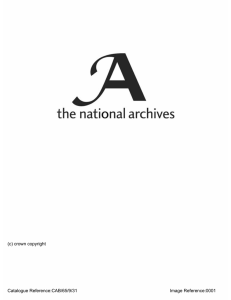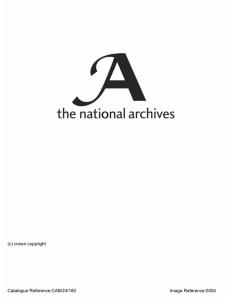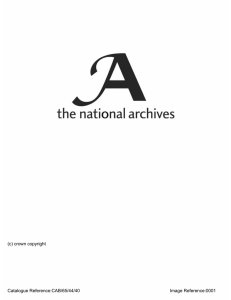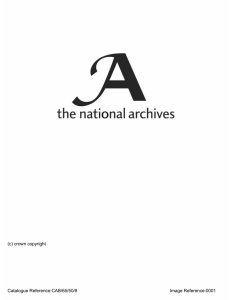(c) crown copyright Catalogue Reference:CAB/65/20/21 Image Reference:0001
advertisement
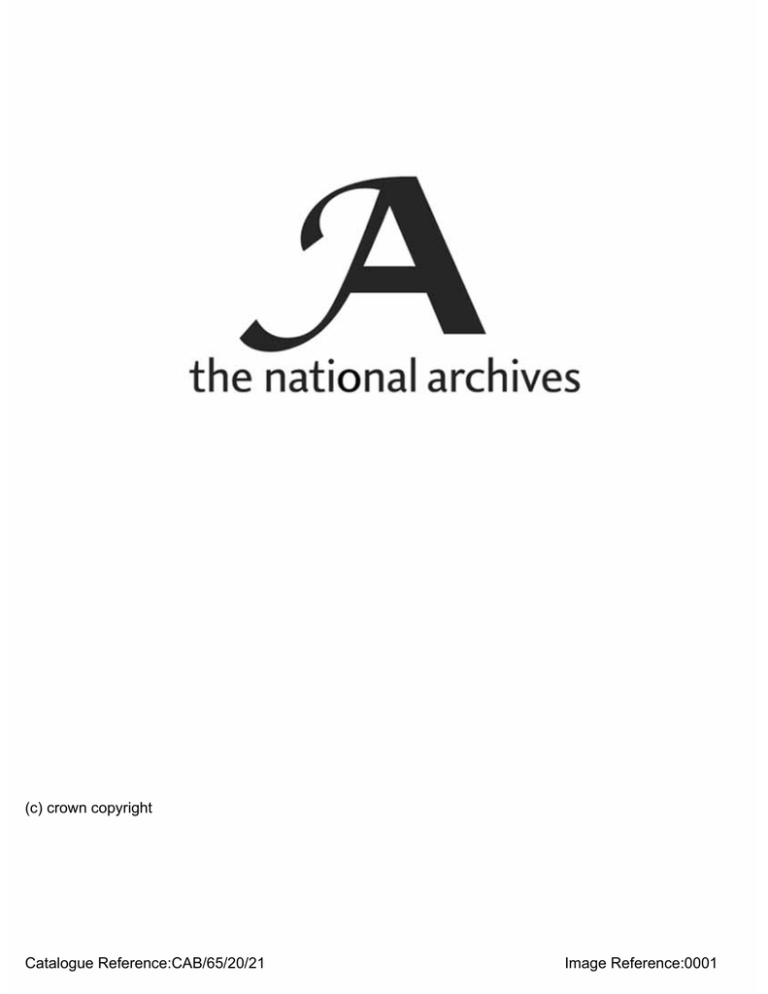
(c) crown copyright Catalogue Reference:CAB/65/20/21 Image Reference:0001 THIS D O C U M E N T IS T H E P R O P E R T Y OF H I S B R I T A N N I C M A J E S T Y ' S Printed for the War Cabinet. GOVERNMENT December 1941. SECRET. Copy No. W.M. ( M ) . 128th Conclusions. TO BE KEPT UNDER LOCK A N D KEY. It is requested that special care may be taken to ensure the secrecy of this document. WAR CABINET 128 ( 4 1 ) . CONCLUSIONS of a Meeting of the War Cabinet held at 10 Downing S.W. 1, on Monday, December 15, 1941, at 5 P . M . Street, Present: The Right Hon. C. R. A T T L E E , M.P., Lord Privy Seal (in the Chair). The Right Hon. Sir J O H N A N D E R S O N , The Right Hon. A. G R E E N W O O D , M.P., M.P., Lord President of the Council. Minister without Portfolio. The Right Hon. Sir K I N G S L E Y W O O D , The Right Hon. E R N E S T B E V I N , M.P., M.P., Chancellor of the Exchequer. Minister of Labour and National Service. The following were also present: The Right Hon. Sir E A R L E P A G E , Special Envoy from the Government of the Commonwealth of Australia. The Right Hon. H E R B E R T M O R R I S O N , M.P., Secretary of State for the Home Department and Minister of Home Security. The Right Hon. L. S. A M E R Y , M.P., Secretary of State for India and Secretary of State for Burma. The Right Hon. A . V. A L E X A N D E R , M.P., First Lord of the Admiralty. Hon. Sir A R C H I B A L D SINCLAIR, Bt., M.P., Secretary of State for Air. The Right Hon. R. A. B U T L E R , M.P., President of the Board of Education. Sir O R M E . S A R G E N T , Deputy UnderSecretary of State, Foreign Office. Air Chief Marshal Sir W I L F R I D FREEMAN. Vice-Chief of the A i r Staff. The Right The Right Hon. V I S C O U N T C R A N B O R N E , Secretary of State for Dominion Affairs. The Right Hon. L O R D M O Y N E , Secretary of State for the Colonies. Captain the MARGESSON, Right Hon. H. D. M.P., Secretary of State for War. The Right Hon. B R E N D A N B R A C K E N , M.P., Minister of Information. The Right Hon. J A M E S S T U A R T , M.P., Joint Parliamentary Secretary to the Treasury. General Sir A L A N B R O O K E , Chief of the Imperial General Staff. Vice-Admiral H. R. M O O R E , Vice-Chief of Naval Staff. Secretariat : Sir EDWARD BRIDGES. Major-General Sir [23259] Mr. W. Mr. L. D. F. HASTINGS ISMAY. WILKINSON. BURGIS. B WAR CABINET 128 (41). CONTENTS. Minute No. 1 Subject. Official Histories .... The Present War. 2 .... Page 223 ''* Parliament 223 Proposed Secret Session. 3 Parliament .... .... 223 A r r a n g e m e n t s for t h e R e c e s s . 4 Parliament .... .... .... .... .... 223 P o w e r s of t h e H o u s e of C o m m o n s i n t h e e v e n t of M r . S p e a k e r s death. 5 Naval, Military,and Air Operations.... .... .... .... 224 .... 225 Air Operations. Naval Operations: Shipping Losses. Military Operations: Libya. Par East: Malaya. U.S.S.R. 6 The Allies Inter-Allied Co-ordination. 7 The Empire 225 P l a n n i n g of P r o d u c t i o n . 8 U.S.S.R 226 Official Histories. The P r e s e n t War. 1. The War Cabinet had before them a Memorandum by the President of the Board of Education (W.P. (G) (41) 140). The War C a b i n e t (i) Took note, with approval, of the preparatory work in hand for the work of writing official histories of the war. (ii) Approved the proposed public announcement of the estab­ lishment of the Advisory Committee of university historians, and of the Editorial Board of the Medical History. Parliament. 2. The Lord Privy Seal said that several Members of Parliament were pressing for a Debate before the recess. The subjects which they desired to discuss were— Proposed Secret Session. (a) The circumstances attending the loss of the Prince of Wales and the Repulse. (b) The machinery for inter-Allied co-ordination. Neither subject could well be discussed except in Secret Session, and there were reasons why it would be difficult to agree to a discussion in Secret Session on any day earlier than Friday, the 19th December. This, however, might well involve a further sitting on Saturday, the 20th December, on which date the House would adjourn. After discussion, the War Cabinet— Agreed that the Members concerned should be informed that the Government were willing that the matters in question should be discussed at a Secret Session on Friday, the 19th December, though this might involve a further Meeting of the House on Saturday, the 20th December; but that they could not agree to the Secret Session being held on an earlier date. Parliament. Arrangements for t h e E e c e s s . 3. The War Cabinet were informed that in the previous year Parliament had adjonrned on the 19th December and had reassembled on the 21st January. It was desired to have a recess of about the same length this year. The Motion passed in each House would, of course, contain the usual provision for the immediate recall of the House if the need arose. The War C a b i n e t Authorised the Joint Parliamentary Secretary to the Treasury to make arrangements on the basis that the House would adjourn at the end of the week until Tuesday, the 20th January. Parliament. P o w e r s of t h e H o u s e of Commons in t h e e v e n t of Mr. Speaker's death. [23259] 4. The War Cabinet— Authorised the Lord Privy Seal to make the necessary arrangements for the drafting of a Bill, on the lines set out in W.P. (G) (41) 145, dealing with the powers of the House of Commons in the event of Mr. Speaker's death. Naval, Military and Air Operations. 5. The Chiefs of Staff gave the following information in amplification of Cabinet War Room Records Nos. 828-834 : (Previous Reference: W M . (41) 1 2 5 t h Conclusions, M i n u t e 3.) Air Operations. Summary of aircraft losses since the 8th December : Home Theatre Enemy—r 6 destroyed. 8 damaged. Our Own—* 13 fighters. 6 bombers. 7 Coastal Command aircraft. Middle East (mainly in the Libyan Battle)— Enemy— 70 destroyed. Our Own— 61 destroyed. ' Far East (on the basis of incomplete information)— Enemy— 7 destroyed. Our Own— 11 destroyed. 1 Naval Operations. Shipping Losses. Military Operations. Libya. Far Bast. Malaya. In addition to the above, we had destroyed one Vichy French aircraft near Freetown. In Home Waters eight enemy merchant vessels had been hit; in Mediterranean waters two enemy merchant vessels had been hit. The cruiser Galatea had been sunk by a U-boat on the previous night off Alexandria. The sloop Flamingo had been bombed and damaged, but had made harbour. The destroyer Puckeridge had been disabled by bombs west of Milford Haven, but had been towed into port. Four trawlers had been sunk, two off Gibraltar and two off the East Coast. Four of our destroyers in the Eastern Mediterranean had sunk two Italian cruisers and damaged a torpedo boat. A U-boat had been sunk off Bardia and prisoners taken. Another U-boat had been shelled and, it was hoped, sunk. The submarine Urge had obtained two hits on an Italian battleship near Messina. In the previous week we had lost 30,000 tons of shipping from enemy action and 6,000 from marine casualties. Another 13,000 tons of shipping had been damaged. 51,000 tons of shipping had been reported sunk so far this month. Belated reports of substantial sinkings in the Pacific must be anticipated. On the 10th December enemy forces had started withdrawing to their present position, which extended from Gazala to some 25 miles to the south. There were indications that they would endeavour to withdraw further to the Mechili-Derna line. On the 13th December the 4th Indian Division had destroyed 16 enemy tanks out of 50, which was believed to be the total number left to the enemy. ^ In north-east Malaya the brigade holding the Kota Bahru area had fallen back some 25 miles. In north-west Malaya a line was now held about 22 miles south of Alor Star. A t Krohcol our forces had withdrawn to 4 miles west of Kroh. In Burma there had been heavy air attacks on Tavoy, Mergui and Victoria Point aerodromes, which were all out of action. A t Hong Kong our forces had with­ drawn to the Island, which was being heavily shelled. In the Philippines three landings had been effected in Luzon. I: ' U . S . S . R . The Allies. Inter-Allied Co-ordination. The Japanese intentions appeared to be—­ (a) A major attack on Singapore with a simultaneous, but less powerful, attack on Luzon; (b) An attack on Hong Kong; (c) A n advance on Rangoon and/or Lashio with a view to stopping our supplies to China. The Russians had had marked successes against the northern and southern arms of the German pincer movements to envelop Moscow. In the Klin and Tula areas the Germans had been forced back with heavy casualties and large losses of equipment. The depth of the withdrawal in the Tula area was as much as 50 miles. It seemed that, after attempting to capture Moscow, the Germans had decided to withdraw to a shorter line during the winter, and this withdrawal had been hastened by the Russian offensive. The Russians were still attacking along this part of the front. The War Cabinet took note of the above statements. 6. The Lord President of the Council referred to telegram 5805 from Washington. There were other indications that we might be pressed to introduce some rather elaborate form of InterAllied co-ordination. In his view the circumstances of the present war were wholly different from those of the last war, and it would be rash to assume that the machinery for a Supreme War Council set up in the last war was applicable in the present circumstances. Sir Earle Page said that he felt sure that opinion in Australia would be that the British Empire, by virtue of its being a world­ wide Power, was best fitted to retain the leadership in this matter and not relinquish it to any other country. The Lord Privy Seal referred to the fact that this matter was likely to be raised in the Secret Session on Thursday. He thought it would be useful that a statement should be prepared as to the machinery of Inter-Allied co-ordination which at present existed, and a study undertaken of such developments as would appear likely to be required in the future. The War C a b i n e t Expressed agreement with this view, and instructed the Secretary to arrange for the preparation of a statement on the lines proposed. The E m p i r e . P l a n n i n g of Production. 7. I connection with the preceding item, the Minister of Labour and National Service thought that it would be desirable, at some stage, that there should be an Inquiry into the man-power position on a wider basis than the resources of the United Kingdom. The Secretary of State for India suggested that more could be done to increase production facilities in India. n I t was pointed out that any such increase would mean sending some skilled labour overseas. The First Lord of the Admiralty mentioned that he was already finding it difficult to get labour to send to Admiralty yards overseas. The view was expressed that it would be an advantage if this latter problem could he dealt with as part of some general scheme for the co-ordination of Empire production rather than as a separate issue. But the problem raised by the First Lord was an immediate one, which could not await the result of any long Inquiry. The War Cabinet took note of these statements. U.S.S.B. (Previous Eeference: W . M . (41) 1 2 4 t h Conclusions, M i n u t e 3.) 8. The War Cabinet had a further discussion on a point arising out of the forthcoming discussions with the Soviet Government. A record of the discussion is contained in the Secretary's Standard File of War Cabinet Conclusions. Great George Street, S.W. 1, December 15, 1941.

